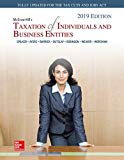
Loose Leaf for McGraw-Hill's Taxation of Individuals and Business Entities 2019 Edition
10th Edition
ISBN: 9781260189728
Author: Brian C. Spilker Professor, Benjamin C. Ayers, John Robinson Professor, Edmund Outslay Professor, Ronald G. Worsham Associate Professor, John A. Barrick Assistant Professor, Connie Weaver
Publisher: McGraw-Hill Education
expand_more
expand_more
format_list_bulleted
Question
Chapter 4, Problem 13DQ
To determine
Identify who qualifies as a taxpayer’s dependents, if taxpayers are not allowed to claim deductions for dependency exemption.
Expert Solution & Answer
Want to see the full answer?
Check out a sample textbook solution
Students have asked these similar questions
General accounting
A mund te ma tregoni detyren
Park Inc. Is preparing it's cash budget for September on these financial accounting question
Chapter 4 Solutions
Loose Leaf for McGraw-Hill's Taxation of Individuals and Business Entities 2019 Edition
Ch. 4 - How are realized income, gross income, and taxable...Ch. 4 - Prob. 2DQCh. 4 - Prob. 3DQCh. 4 - Why should a taxpayer be interested in the...Ch. 4 - Is it easier to describe what a capital asset is...Ch. 4 - Prob. 6DQCh. 4 - Prob. 7DQCh. 4 - Prob. 8DQCh. 4 - Prob. 9DQCh. 4 - How do taxpayers determine whether they should...
Ch. 4 - Prob. 11DQCh. 4 - Prob. 12DQCh. 4 - Prob. 13DQCh. 4 - Prob. 14DQCh. 4 - Prob. 15DQCh. 4 - Prob. 16DQCh. 4 - Prob. 17DQCh. 4 - Prob. 18DQCh. 4 - Prob. 19DQCh. 4 - Prob. 20DQCh. 4 - How do two taxpayers determine who has priority to...Ch. 4 - Prob. 22DQCh. 4 - Prob. 23DQCh. 4 - Prob. 24DQCh. 4 - Prob. 25DQCh. 4 - For tax purposes, why is the married filing...Ch. 4 - Prob. 27DQCh. 4 - Prob. 28PCh. 4 - David and Lilly Fernandez have determined their...Ch. 4 - Prob. 30PCh. 4 - Prob. 31PCh. 4 - Prob. 32PCh. 4 - Prob. 33PCh. 4 - Prob. 34PCh. 4 - The Samsons are trying to determine whether they...Ch. 4 - Prob. 36PCh. 4 - Francines mother Donna and her father Darren...Ch. 4 - Jamel and Jennifer have been married 30 years and...Ch. 4 - Dean Kastner is 78 years old and lives by himself...Ch. 4 - Prob. 40PCh. 4 - Prob. 41PCh. 4 - Prob. 42PCh. 4 - Prob. 43PCh. 4 - Prob. 44PCh. 4 - Prob. 45PCh. 4 - Prob. 46PCh. 4 - Prob. 47PCh. 4 - Prob. 49PCh. 4 - Prob. 50PCh. 4 - Prob. 51PCh. 4 - Prob. 52PCh. 4 - Prob. 53PCh. 4 - Prob. 54CPCh. 4 - Prob. 55CPCh. 4 - Prob. 56CPCh. 4 - Prob. 57CP
Knowledge Booster
Similar questions
- General Accounting Question please answerarrow_forwardIncorrect Question 6 0 / 10 pts Audit Organization ABC is evaluating the different non-audit services it provides to its various clients. Indicate which of the following non-audit services would impair its independence. There are multiple answers. (Hint: There are five non-audit services that would impair the firm's independence). Hiring or terminating the audited entity's employees. Preparing financial statements in their entirety from a client-provided trial balance. Evaluation of an entity's system of internal control performed outside the audit. Approving entity transactions. Supervising ongoing monitoring procedures over an entity's system of internal control. Preparing certain line items or sections of the financial statements based on information in the trial balance. Preparing account reconciliations that identify reconciling items for the audited entity management's evaluation. Changing journal entries without management approval. Posting coded transactions to an audited…arrow_forwardFinancial Accountingarrow_forward
arrow_back_ios
SEE MORE QUESTIONS
arrow_forward_ios
Recommended textbooks for you
 Individual Income TaxesAccountingISBN:9780357109731Author:HoffmanPublisher:CENGAGE LEARNING - CONSIGNMENT
Individual Income TaxesAccountingISBN:9780357109731Author:HoffmanPublisher:CENGAGE LEARNING - CONSIGNMENT



Individual Income Taxes
Accounting
ISBN:9780357109731
Author:Hoffman
Publisher:CENGAGE LEARNING - CONSIGNMENT


